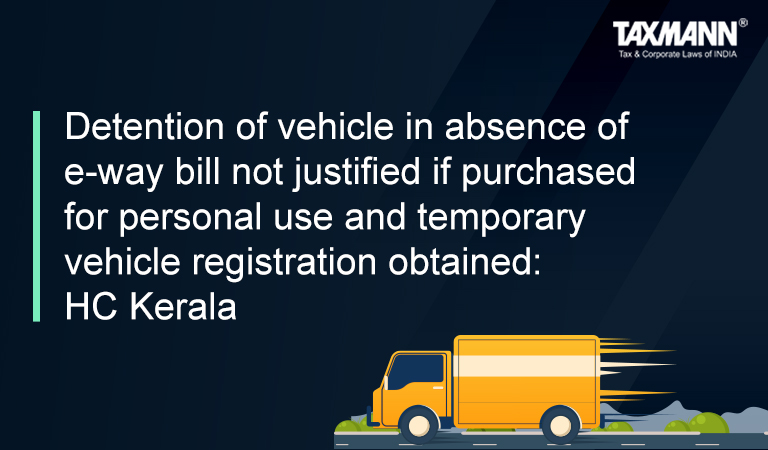Detention of vehicle in absence of e-way bill not justified if purchased for personal use and temporary vehicle registration obtained: HC Kerala
- Blog|News|GST & Customs|
- 2 Min Read
- By Taxmann
- |
- Last Updated on 24 December, 2024

Case Details: Assistant State Tax Officer (Intelligence), Alappuzha v. VST AND Sons (P.) Ltd. - [2021] 130 taxmann.com 486 (Kerala)
Judiciary and Counsel Details
-
- S.V. Bhatti and Bechu Kurian Thomas, JJ.
- Mohammed Rafiq, Govt. Pleader for the Appellant.
- A. Kumar, Adv. for the Respondent.
Facts of the Case
The assessee was located in Thiruvananthapuram (Kerala) and it purchased a vehicle for personal use from Coimbatore (Tamil Nadu). The proper officer detained the vehicle while being transported from Coimbatore to Thiruvananthapuram for reason that it was transported without e-way bill. The assessee filed writ petition challenging the detention of the motor vehicle. The learned Single Judge allowed the writ petition and quashed the detention order. The department field appeal against it.
High Court Held
The Honorable High Court observed that the goods which are classifiable as used personal and household effect falls under rule 138(14)(a) of the CGST Rules, 2017 and exempted from the requirement of e-way bill. In the present case, the assessee had purchased the vehicle after payment of IGST. A temporary registration was also taken apart from the motor vehicle insurance and the vehicle had in fact run 43 Kms. The Court relied upon the decision in KUN Motor Co. (P.) Ltd. v. Asstt. STO [2018] 100 taxmann.com 271 (Ker.) wherein it was held that used vehicles, even if it has run only negligible distances are to be categorized as ‘used personal effects’. Therefore, it was held that there was no merit in this appeal and liable to be dismissed.
Case Review
-
- VST & Sons (P.) Ltd. v. Asstt. STO (Intelligence) [WP (C) No. 22304 of 2020, dated 21-10-2020] affirmed.
- KUN Motor Co. (P.) Ltd. v. Asstt. STO [2018] 100 taxmann.com 271 (Ker.) (para 7) followed.
List of Cases Referred to
-
- KUN Motor Co. (P.) Ltd. v. Asstt. STO [2018] 100 taxmann.com 271 (Ker.) (para 2).
Disclaimer: The content/information published on the website is only for general information of the user and shall not be construed as legal advice. While the Taxmann has exercised reasonable efforts to ensure the veracity of information/content published, Taxmann shall be under no liability in any manner whatsoever for incorrect information, if any.

Taxmann Publications has a dedicated in-house Research & Editorial Team. This team consists of a team of Chartered Accountants, Company Secretaries, and Lawyers. This team works under the guidance and supervision of editor-in-chief Mr Rakesh Bhargava.
The Research and Editorial Team is responsible for developing reliable and accurate content for the readers. The team follows the six-sigma approach to achieve the benchmark of zero error in its publications and research platforms. The team ensures that the following publication guidelines are thoroughly followed while developing the content:
- The statutory material is obtained only from the authorized and reliable sources
- All the latest developments in the judicial and legislative fields are covered
- Prepare the analytical write-ups on current, controversial, and important issues to help the readers to understand the concept and its implications
- Every content published by Taxmann is complete, accurate and lucid
- All evidence-based statements are supported with proper reference to Section, Circular No., Notification No. or citations
- The golden rules of grammar, style and consistency are thoroughly followed
- Font and size that’s easy to read and remain consistent across all imprint and digital publications are applied



 CA | CS | CMA
CA | CS | CMA
